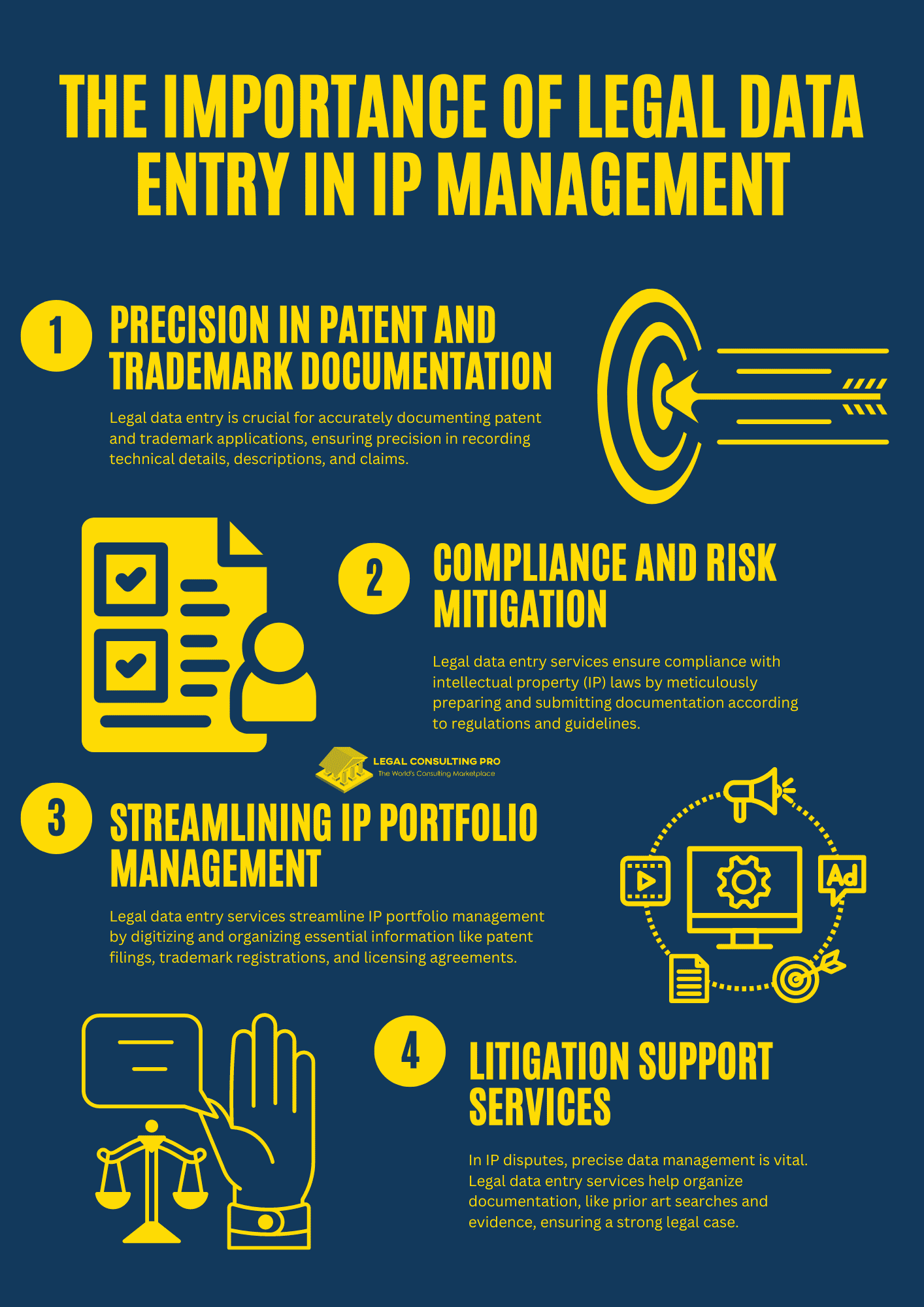Introduction
In today’s fast-paced world, innovation is the lifeblood of progress. Whether it’s a groundbreaking invention, a unique design, or a novel business process, protecting intellectual property (IP) is paramount for businesses seeking to safeguard their competitive advantage. However, managing IP assets effectively requires meticulous attention to detail and precision in data management. In this article, we delve into the indispensable role of legal data entry in IP management, exploring how this critical process ensures the accuracy, integrity, and security of valuable intellectual property assets.
Understanding IP Management
Intellectual property (IP) management refers to the strategic process of identifying, protecting, and maximizing the value of intellectual property assets owned or controlled by a business. These assets encompass a wide range of intangible creations, including patents, trademarks, copyrights, trade secrets, and other proprietary rights. Effective IP management involves various activities, such as patent and trademark filings, licensing agreements, enforcement actions, and portfolio analysis, aimed at safeguarding and leveraging intellectual property assets to achieve business objectives. At its core, IP management seeks to protect innovations, foster an innovation culture, mitigate risks, and capitalize on the value of intellectual property assets in today’s knowledge-based economy.
The Importance of Legal Data Entry in IP Management
- Precision in Patent and Trademark Documentation: Patents and trademarks are among the most valuable assets for businesses, providing legal protection for inventions, brands, and creative works. Legal data entry plays a crucial role in documenting patent and trademark applications accurately, ensuring that all requisite information, including technical specifications, descriptions, and claims, is recorded with precision.
- Compliance and Risk Mitigation: In the realm of intellectual property, compliance with regulatory requirements and adherence to legal standards are paramount. Legal data entry services help businesses navigate the complex landscape of IP laws and regulations by ensuring that all documentation is prepared and submitted under applicable rules and guidelines.
- Streamlining IP Portfolio Management: Managing a diverse portfolio of intellectual property assets requires efficient data management practices. Legal data entry services streamline IP portfolio management by digitizing, organizing, and categorizing relevant information, such as patent filings, trademark registrations, and licensing agreements.
- Litigation Support Services: In the event of intellectual property disputes or litigation, accurate and reliable data management is essential for building a strong legal case. Legal data entry services provide invaluable support to legal teams by meticulously organizing and preparing documentation, such as prior art searches, evidence collection, and discovery requests.

The Role of Litigation Support Services in IP Management
Litigation support services play a crucial role in intellectual property (IP) management by providing valuable assistance during legal proceedings related to IP rights. Here’s how these services contribute to effective IP management:
- Legal Research and Analysis: Litigation support services assist legal teams in conducting comprehensive research and analysis of IP-related laws, regulations, and precedents. This includes identifying relevant case law, statutes, and regulations that may impact IP rights, as well as analyzing court decisions and legal opinions to inform strategic decision-making.
- Document Management and Discovery: Litigation support services help manage the vast amount of documentary evidence involved in IP litigation, including patents, trademarks, copyrights, and trade secrets. They employ advanced document management systems to organize, index, and categorize documents, making them easily accessible for review, analysis, and presentation during legal proceedings.
- Electronic Discovery (eDiscovery): In IP litigation, electronic discovery (eDiscovery) involves the identification, preservation, collection, and production of electronically stored information (ESI) relevant to the case. Litigation support services utilize specialized eDiscovery tools and techniques to search, filter, and analyze ESI from various sources, such as emails, databases, and digital files, ensuring compliance with legal discovery obligations.
- Trial Preparation and Presentation: Litigation support services assist legal teams in preparing for trial by creating demonstrative exhibits, graphics, and presentations to support arguments and evidence related to IP rights. They use multimedia tools and technologies to visualize complex concepts, present key facts and data, and effectively communicate legal arguments to judges and juries.
- Expert Witness Coordination: In IP litigation, expert witnesses often play a critical role in providing technical expertise, opinions, and testimony related to patent validity, infringement, damages, and other issues. Litigation support services help coordinate the selection, preparation, and presentation of expert witnesses, ensuring that their testimony is effectively integrated into the legal strategy.
- Case Management and Support: Litigation support services provide ongoing case management and support throughout the litigation process, including scheduling, calendaring, and tracking key deadlines and milestones. They also assist with administrative tasks, such as preparing court filings, managing exhibits, and coordinating with other parties involved in the case.
- Post-Trial Support and Analysis: After trial, litigation support services help assess the outcome of the case and analyze lessons learned for future litigation strategy and IP management. They conduct post-trial reviews, evaluate case performance, and identify opportunities for improvement or optimization in IP management practices.
Future Trends and Innovations in Legal Data Entry for IP Management
As technology continues to evolve, the landscape of legal data entry for IP management is also poised for significant advancements. Here are some emerging trends and innovations shaping the future of this field:
- Automation and Artificial Intelligence (AI) Integration: AI-powered tools are increasingly being integrated into legal data entry processes to automate repetitive tasks, improve accuracy, and enhance efficiency. Natural language processing (NLP) algorithms can analyze and extract relevant information from large volumes of documents, reducing the time and effort required for manual data entry.
- Blockchain Technology for IP Protection: Blockchain technology offers a decentralized and immutable ledger that can be leveraged to enhance the security and integrity of intellectual property rights. By recording ownership, licensing agreements, and other IP-related transactions on a blockchain network, legal data entry processes can become more transparent, tamper-proof, and resistant to fraud or unauthorized access.
- Cloud-Based Data Management Solutions: Cloud computing offers scalable and flexible platforms for storing, accessing, and managing IP-related data. Cloud-based legal data entry solutions enable real-time collaboration among stakeholders, seamless integration with other IP management tools, and enhanced data security through advanced encryption and access controls.
- Integration with Intellectual Property Management Software: Legal data entry processes are increasingly being integrated with specialized intellectual property management software platforms. These platforms provide comprehensive tools for managing patent, trademark, and copyright portfolios, streamlining workflows, and facilitating compliance with IP laws and regulations.
- Enhanced Data Security and Compliance Measures: With the growing importance of data security and privacy regulations, future trends in legal data entry for IP management will focus on implementing robust security measures and ensuring compliance with relevant laws and standards. This includes encryption techniques, multi-factor authentication, and regular audits to identify and mitigate potential risks.
- Advanced Analytics and Reporting Capabilities: Future innovations in legal data entry will include advanced analytics and reporting capabilities to provide insights into IP portfolios, trends, and opportunities. By leveraging data visualization tools and predictive analytics algorithms, stakeholders can make informed decisions regarding IP strategy, licensing agreements, and enforcement actions.
- Integration with Emerging Technologies: Legal data entry for IP management will continue to evolve in tandem with emerging technologies such as augmented reality (AR), virtual reality (VR), and the Internet of Things (IoT). These technologies offer new opportunities for IP creation, protection, and monetization, requiring innovative approaches to legal data entry and management.
- Continuous Improvement and Adaptation: As the legal and technological landscape evolves, future trends in legal data entry for IP management will prioritize continuous improvement and adaptation. This includes ongoing training and upskilling of legal professionals, embracing new tools and methodologies, and staying abreast of changes in IP laws, regulations, and industry best practices.
Conclusion
In an increasingly competitive and innovation-driven landscape, safeguarding intellectual property is vital for businesses seeking to maintain their competitive edge and maximize the value of their innovations. Legal data entry plays a critical role in IP management by ensuring the accuracy, integrity, and security of vital information related to patents, trademarks, copyrights, and other intellectual property assets. By leveraging legal data entry services, businesses can navigate the complexities of IP management with precision and confidence, safeguarding their innovations and preserving their competitive advantage in the global marketplace.
Blogs related to legal data entry:
Legal Data Entry: Navigating the Labyrinth: Simplifying Immigration Processes







































